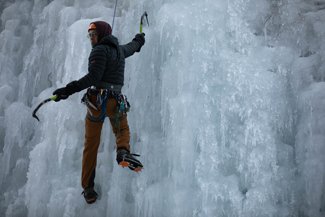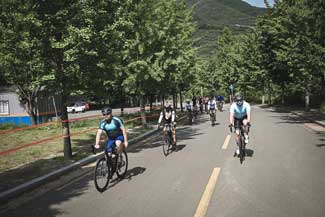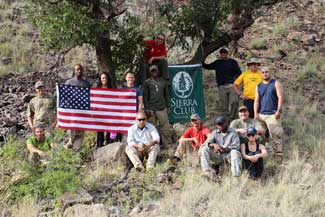A Soldier Found Healing Outdoors. Now He Wants to Break Down Barriers for Others.
In 2013, U.S. Army Maj. Aaron Leonard led 12 soldiers from Fort Bliss on a five-day backpacking trip in Big Bend National Park in Texas, just over 300 miles away from their home base.
“We were laying out one night on a mesa,” Leonard, a former artillery officer recalled, “staring at the most incredible sky, stars from one horizon to the other. No light pollution at all. Clean air. It’s quiet. You just hear a coyote every now and then or an owl. There are no cars, there’s no cell phones going off, there’s no connection to anything. And we’ve been out there for a number of days. And I felt so at peace in that one moment.”
Like many others who served during wartime, by the time he got back, Leonard had forgotten what it was like to be at peace. The trip to Davis Mountain was evidence of how far he’d come toward remembering.

Fernando Martinez, a guide with the Outdoor Recreation Center, scales the side of an ice mountain during a climbing trip with the Better Opportunities for Single Soldiers program and the Outdoor Recreation Center, Directorate of Family and Morale, Welfare and Recreation, at Ouray, Colorado. Photo by Pfc Joshua Zayas, courtesy of the U.S. Army.
He had returned in 2011 from his fourth combat deployment—the first during Desert Storm; three others in Iraq with the 1st Cavalry—feeling hyper-alert and irritable, drinking more than he should.
But he was still on active duty, a newly minted lieutenant colonel with his eyes set on becoming a battalion commander, and the stigma attached to seeking professional help kept him from seeing a clinician.
“I was ignoring those symptoms,” he told The War Horse in a recent interview. “I was one of those guys that got caught up in the ‘go to Iraq for a year, come home for a year, go to Iraq for a year, go home for a year.’ And so I did that, three different tours back to back like that.”
He needed to find a way through, and he found it in nature, accepting an invitation to go on a week-long dog sledding trip in Minnesota’s Boundary Waters with Outward Bound, a nonprofit dedicated to challenging people through outdoor expeditions.
“The weather [was] deadly,” Leonard recalled. “From the minute you wake up, until you go back to sleep at night, you’re on the move, you’re doing something for the team, not just yourself. … You’re working with dogs, you’re driving a sled across a lake.”
He and the other soldiers slept side by side under a tarp on top of a frozen lake. Then they’d wake up, gather wood to build a fire, then boil water and cook breakfast.
It was one of the most physically challenging outdoor experiences he’d ever had, and in it, he said, “I saw an opportunity to identify high-risk soldiers in our military unit, and offer some alternative ways to work with them,” taking them outdoors, giving them a task that had nothing to do with the military and getting them to complete it.
Studies have shown that exposure to nature and outdoor activities can be beneficial to veterans who suffer from post-traumatic stress, traumatic brain injury, depression, or other conditions, helping to reduce symptoms, decrease tension, anger, and depression, and increase quality of life and psychological well-being.
While stationed at Joint Base Langley-Eustis in Virginia, Leonard started leading soldiers on trips. But it was the backpacking expedition that made him realize he wanted to do more.
“That is when I decided to retire and spend my next chapter of my life in this line of work,” he said. “When I came back from that trip, I went to see a psychologist and I submitted my retirement paperwork.”
At 46, a divorced father of five adult children, he went to graduate school, and began working in the field of outdoor adventure and experiential education—a teaching philosophy based on confronting challenges and reflecting on the experience afterward.
Now Leonard is the executive director of Another Summit, a program based in the Hudson Valley, just north of New York City, that offers outdoor adventures for veterans and first responders at no cost to them. Last year, he said, the program ran 145 trips in the Northeast, involving activities from walking and hiking to backpacking, paddling, and fly fishing. He also works with Sierra Club Military Outdoors.

Participants of the 2021 Cycling Challenge take part in a group ride in Gachang Valley, South Korea. Studies have shown that exposure to nature and outdoor activities can be beneficial to veterans who suffer from post-traumatic stress, traumatic brain injury, depression, or other conditions, Photo by Melissa Diehl, courtesy of the U.S. Army.
For Leonard, one of the biggest challenges has been trying to increase the diversity in outdoor programming. Early on, he noted that most of the veterans and active duty soldiers who went on outdoors expeditions were, like him, white and male. When New York State Rep. Didi Barrett asked him to advise her on legislation she was authoring to create more outdoor-based recreation opportunities for veterans, particularly those struggling with mental health issues, Leonard said he began to look more closely at the barriers that might keep nonwhite, disabled, or elderly veterans from participating in outdoors recreation.
In working on the bill, Leonard said, they identified more than 20 different barriers that the 838,000 veterans living in New York State might face at some point when they try to access public lands. The legislation, called the Outdoor Rx Act, was signed into law in 2020, by then-Gov. Andrew Cuomo.
With two other researchers—Joanna Bettmann Schaefer, a professor in the University of Utah’s College of Social Work, and Ellison Blumenthal, of the University of New Hampshire—Leonard also carried out a study of the visual images used by outdoor adventure programs that serve veterans in their marketing.
Award-Winning Journalism in Your Inbox
In the study, four coders independently coded the visual imagery used in the landing pages and social media of 306 organizations offering outdoors programs for veterans. The research found that most of the images used to advertise the programs were of white men, with only a minority showing women or people of color.
“Unless such programs change their online materials, female veterans and veterans from racially diverse backgrounds and marginalized communities may continue to face significant barriers in accessing outdoor programming,” Leonard and his co-authors concluded.
Some programs that serve veterans have already taken the initiative to start a conversation about equity and accessibility.
For example, Kevin Fallon, a retired Marine Corps major and the chief operations officer of Patrol Base Abbate, a nonprofit that offers “recalibration” programs for active duty soldiers and “return to base” programs for veterans, said the organization is working actively to make sure programs are more inclusive.
“When I first came on board, there was a low rumbling that we are being discriminatory, not by commission, but by omission,” Fallon said. “We have trended in a way that we have attracted only male and primarily combat arms veterans. When I heard this, I was taken aback because it crumbles the entire foundation of how we formed.”

Another Summit, a program based in the Hudson Valley, just north of New York City, offers outdoor adventures for veterans and first responders at no cost to them. Photo courtesy of the author.
He added, “The one problem that we did identify was that our marketing was a little bit off, our website didn’t reflect reality.” Their response, he said, was, “Let’s reduce that barrier. Right, let’s change the picture. And let’s, let’s accurately reflect that.”
For Leonard, his work toward removing barriers to recreational therapy has expanded along with his research. He plans to study the physical barriers that veterans face when trying to access public lands and waters in New York, like a lack of public transportation, a lack of accessible facilities for elderly or disabled veterans, and other factors. New York has more than 4.5 million acres of public land, including coastline.
The study will identify areas that might be addressed through legislation or changes in policy, Leonard said, with the hope that if changes are put in place in New York, the Sierra Club, which has 64 chapters around the country and has partnered with the Outdoor Rx Coalition, could then push for those advances to be replicated in other states.
Our Journalism Depends on Your Support
His own experience, Leonard said, shows that the outdoors can have a profound effect, even in a matter of days—something backed up by an increasing body of research.
“The science behind it says that the sense of awe can come from being in the natural world with other people, doing some type of thing together, whatever that is,” he said.
This War Horse story was reported by Francisco Martínezcuello, edited by Erica Goode, fact-checked by Jess Rohan, and copy-edited by Mitchell Hansen-Dewar. Kristin Davis wrote the headlines.





Comments are closed.